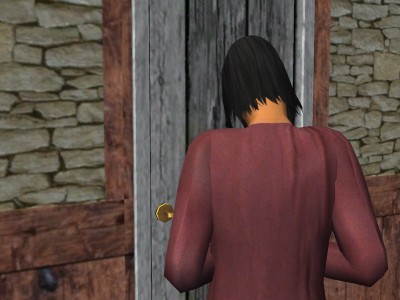
“Who is it?” she barked. Her voice had not weakened.
“It is Egelric,” he called through the wooden door.
Silence.
“Wodehead,” he added.
“I know your name. Come in here. I can’t get up.”
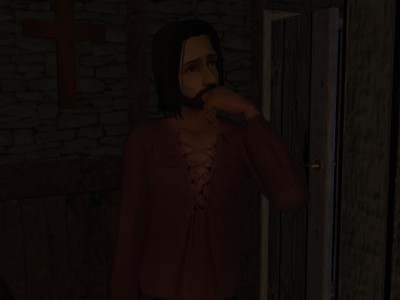
He opened the door and stepped into the little house he had not entered in nearly ten years. It was as simple and as spotless as ever, but it had lost the reek of herbs, and the walls and rafters were bare where once they had been an inverted thicket of dried plants. Elfleda’s mother lay on her bed against the wall.
“Good day, Elfrida.”
“I never thought to see you again,” she scowled.
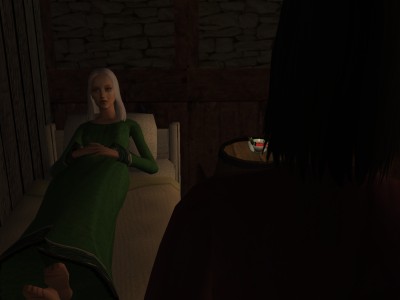
“I heard you were not well.”
“I’m dying. Is that what they told you?”
“It was.”
“I always said I couldn’t cure everybody, and now I find not even myself. Well! It got you here, anyway. I wonder why you came. Generosity, curiosity, or what?”
“I am at your service.”
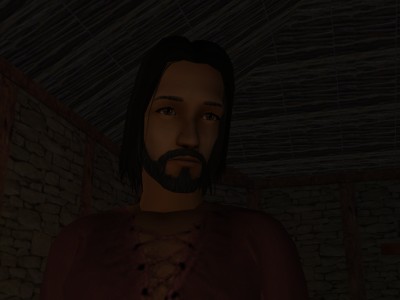
“Well, you might sit down. You haven’t changed. You still dress like a peasant, though you carry yourself like a prince. You always did, though. Fooled Elfleda.”
He inclined his head in a gesture of princely submission and then sat.
“How are things in your accursed valley? I hear things, but always third-hand.”
“We are well and happy.”
“How is your Queen? I heard she was mad.”
“Some might call it that.”
She began to laugh – or cackle, as he would have called it – but was quickly overcome by a fit of coughing. She pulled out a fine, straw-colored cloth and held it over her mouth as she coughed, and meanwhile Egelric discreetly looked down at his boots.
After the fit passed, she carefully folded the cloth and tucked it away again. “Her mother was mad as a badger,” she said with relish. “Didn’t know that, did you?”
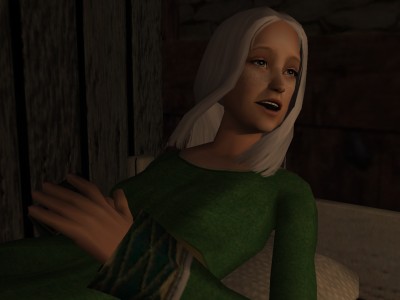
“I know nothing about her family except that they were gentlemen.”
“Oh, they were that, but she was stark mad. Her brother the abbot told everyone she was dead, but he had her shut up in there with him for years before she died. I know. I tended her.”
“I had no idea,” Egelric said quietly.
“That Maud was a real kittle gal too,” Elfrida cackled. “I always knew she would go mad. I always told that abbot to keep her locked up and not let her marry. Let that blood run dry, that’s what I said. He was right to become a priest, for that matter. Didn’t listen to me,” she shrugged. “But now I guess he regrets it. Or, no – I guess he got what he wanted anyway.” She laughed again, but pulled out her cloth and kept it cautiously poised near her lips. “Oh, Egelric, there’s one thing about dying, it’s you get to say whatever you want and never mind the consequence.”
“I shan’t mention this to His Majesty.”
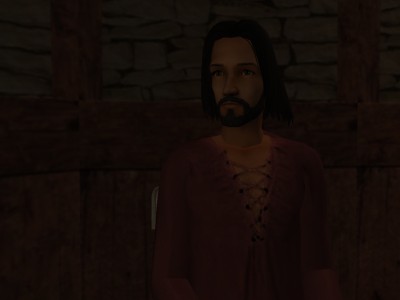
“Oh, His Majesty. You ought to warn him that his girls will go mad too, someday.”
“I certainly shan’t. They may not.”
“Oh, very well. But you ought to know what mad looks like. You lived with it.”
Egelric closed his eyes and sighed. He knew it would be like this.
“Oh, I don’t blame you for that. She had it in her blood too. It’s that elf blood. I guess it has run dry now.”
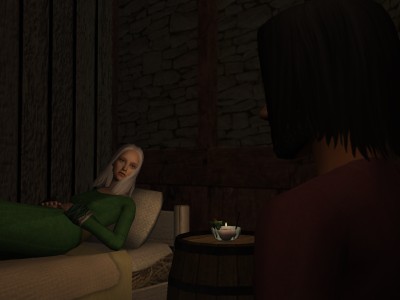
Egelric opened his eyes again, and found himself impaled on her sharp and searching stare. He was tempted to tell her about Finn, her grandson, whom she apparently believed dead. He did not trust her to hold her tongue, and yet it seemed cruel not to tell her. Or perhaps he only wanted to make amends.
“And now you got your girl, who is all elf. And so it starts over again.” She chuckled for a moment, and then stopped abruptly and glowered at him.
“It hasn’t run dry,” he said quietly, and immediately wondered why he had.
“What hasn’t?”
“My son – Elfleda’s son – still lives.”
“You tell me that the elves killed all those men, and yet they let your son live? Why?” she barked. “You don’t know the elves. I don’t believe you.”
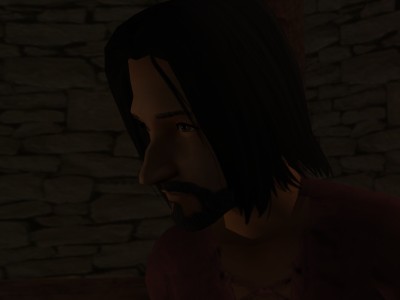
He got up and fished in the pouch he wore at his belt, searching out the little silk purse in which he carried the snippet of hair. He removed it gingerly – he never took it out, himself, but only felt it inside the silk. But he wanted to show her. He was dying to show somebody.
“It could be anybody’s,” she sniffed after staring at it for a long moment.
“Would you like to hold it? It is your grandson.”
“You lie.”
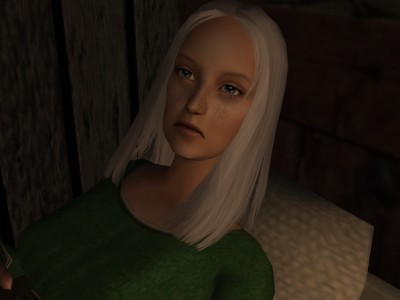
“I spoke with an elf,” he said, eager to tell the story. “A young elf, who knows him. He’s a little boy now, and he looks like me, but he has Leda’s fair skin, and he has a pet rabbit,” he said, beginning to grow giddy, “and he likes to take his bath, and he – ”
“His bath?” she interrupted.
“Aye. He likes to play in the water.”
“Let me see that.”
He handed her the dark curl, and she held it on her palm like an insect she would try to identify.
“I wish it were red,” he said, and again he wondered why.
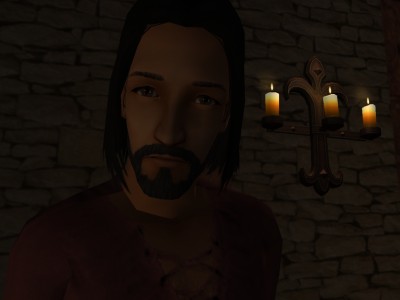
“Your grandfather’s head will never be altered. He doesn’t look like you. He looks like old Duncan.” She pressed her two hands together for a moment, the lock of hair between the palms, and then handed it back to him. “If the elves don’t mean to kill him, then you must allow him to remain with them.”
“Why?”
“He would never be happy otherwise,” she said.
“How do you know that?” he asked. He put the curl away again, angry at himself for having shown her, and angry at her for what she was telling him.
“I know. Leda knew. My mother knew.”
“Why?”
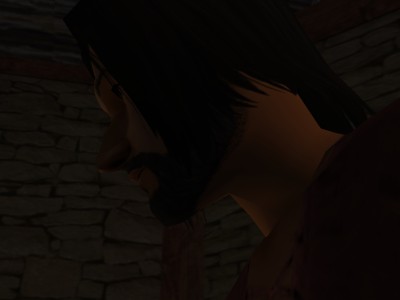
“The elf in him will be craving the elves.”
“He is more man than elf.”
“So was Leda. So am I. You must give him up.”
“How can you ask such a thing?” he cried. “My son!”
“How can I? How can I?” She began coughing again, but did not let it stop her. “You asked the same of me! My daughter!”
“That was not the same. You might have seen her. You knew where she – ”
“But I never did see her again, did I?” she snarled. “I always knew you wouldn’t make her happy, but I thought you could at least keep her alive! My husband did me!”
“Your husband was dead!”
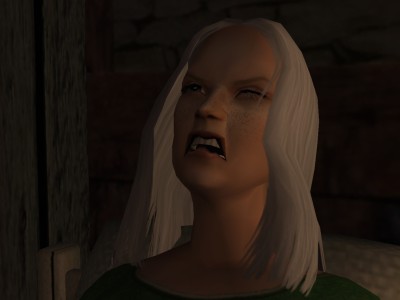
“Perhaps that is what Leda needed! Better you had died! The devil take you!” she howled. “May rain and fire and ill wind follow after you until you’re festering in the earth!”
Egelric turned and went out with her curses still pelting his back, as they had the last time he had turned and gone out of this house. Her voice had not weakened.
“The peace of God on you, Elfrida,” he called over her shouting, and he pulled this door closed for the last time.







She's quite like her daughter, isn't she? (Also: read up to here from the beginning beginning Tuesday. You'd better be proud of yourself for doing such a fantastic job on this.)